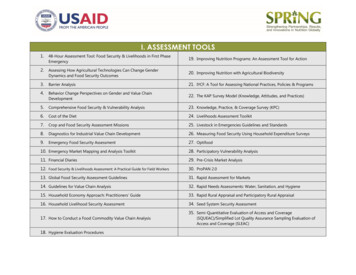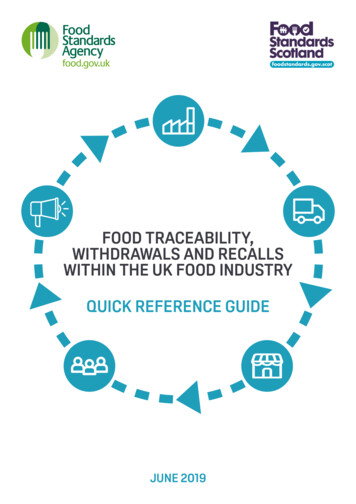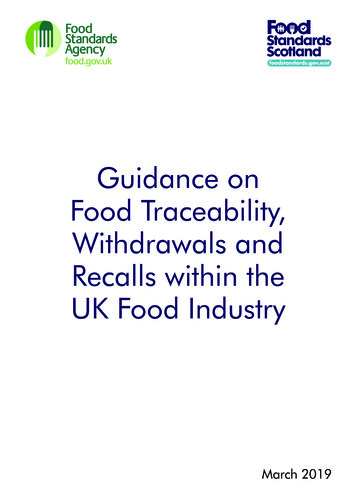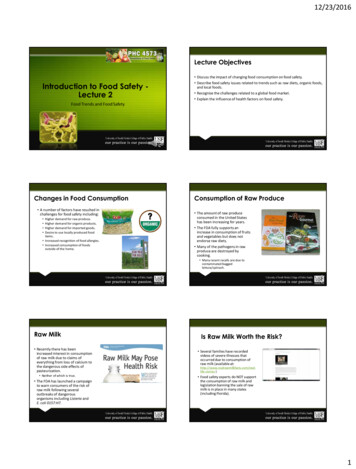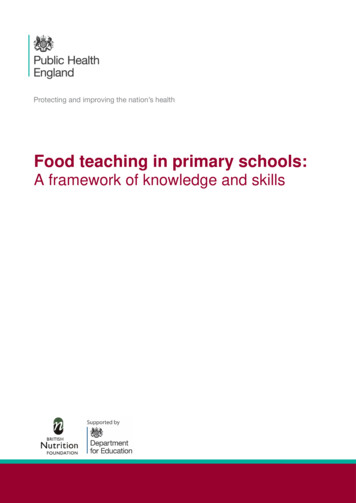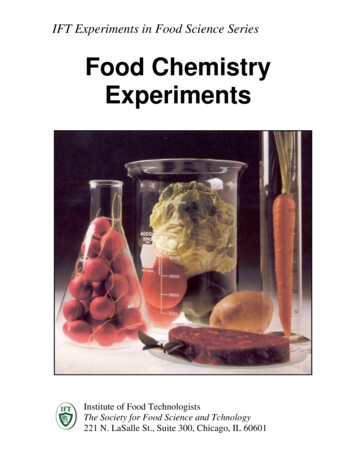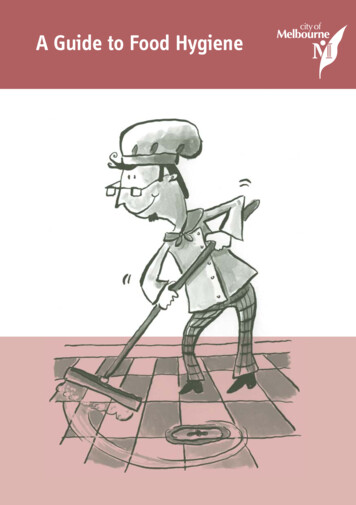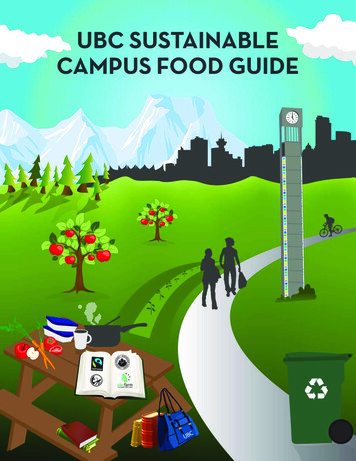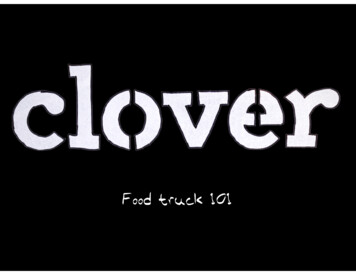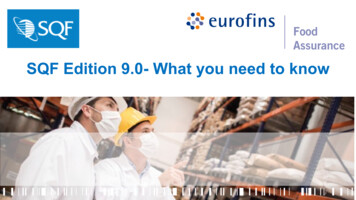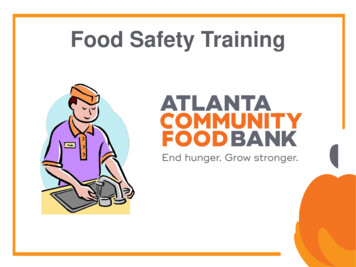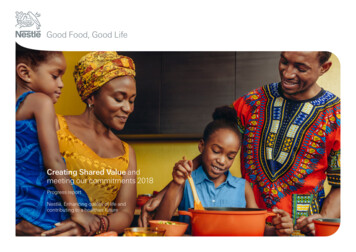
Transcription
Good Food, Good LifeCreating Shared Value andmeeting our commitments 2018Progress reportNestlé. Enhancing quality of life andcontributing to a healthier future
Creating Shared ValueIndividuals and familiesCommunitiesPlanetReporting and governanceWelcome to this 2018 Creating Shared Value progress report.Aimed at shareholders, stakeholders and other interested parties,this report shares detailed information about our issues, impactsand performance against our commitments during the year.35 Our 2020 commitmentsand progressNestlé. Enhancing quality of life and contributing to a healthier future.6A message from our Chairman and CEOAt Nestlé, we believe that businessresults and positive societal impactshould be mutually reinforcing.To be successful in the long term,we must create value for bothour shareholders and for society.We call this approach to businessCreating Shared Value and it isan integral part of our strategy.Improving the nutrition, health andwellness profile of our foods andbeverages is at the heart of whatwe do. We want to contribute tohealthier lives, with a particularemphasis on childhood nutrition.Our Nestlé for Healthier Kidsinitiative brings together all ourefforts – from productreformulation to supportingparents and caregivers.We are also driven to positivelycontribute to the communitieswhere we live and work. Our GlobalYouth Initiative is just one of themany ways we make an impact.We have expanded our efforts hereto address youth unemploymentand help 10 million young peopleaccess economic opportunities by2030. Our commitment to fosterCreating Shared ValueFor individuals and families7 Offering tastier andhealthier choices13 Inspiring people tolead healthier livesdiversity and inclusion within ourcompany is another example. Weare accelerating our efforts in thisarea with a particular focus onincreasing the number of women insenior executive positions globally.21 Building, sharing andapplying nutrition knowledge24 For our communities25 Enhancing rural developmentand livelihoodsWhen it comes to addressingglobal sustainability challenges,one of our key ambitions is to leadthe way in shaping a waste-freefuture. We are committed tomaking our packaging 100%recyclable or reusable by 2025, andhave already taken specific actionon this initiative earlier this year.31 Respecting and promotinghuman rights36 Promoting decent employmentand diversity40 For the planet41 Caring for water46 Acting on climate change49 Safeguarding the environmentAs in previous years, we reaffirmour support for the UN GlobalCompact. As a founding memberof UN Global Compact LEAD, werecognize the importance of thisplatform for driving corporatesustainability leadership andcollective engagement toward the2030 Agenda for SustainableDevelopment.55 Reporting and governance56 About this reportPaul BulckeChairmanMark SchneiderChief Executive Officer57 Independent assurancestatement58 Our key performance indicatorsWe welcome your feedback on thisreport, our commitments and ourperformance.Creating Shared Value progress report 20182
Creating Shared ValueIndividuals and familiesCommunitiesPlanetReporting and governanceCreating Shared ValueCreating Shared Value (CSV) is fundamental to how we do business at Nestlé.We believe that our company will be successful in the long term by creating value,both for our shareholders and for society. Our activities and products should makea positive difference to society while contributing to Nestlé’s ongoing success.Focus on key areasLong‑term value creation requiresfocus. In consultation with experts,we chose to prioritize the threeareas where our business intersectsthe most with society: nutrition,rural development and water. Valuecreation is only possible with a solidfoundation of compliance and aculture of respect, as well as a firmcommitment to environmentaland social sustainability. Ourimpact on these focus areas ismeasured by progress againstpublicly stated commitments,which are informed by ourmateriality assessment and regularfeedback from external groups.The business case forCreating Shared ValueWe cannot maximize long-termsustainable value creation forshareholders at the expense ofother stakeholders. We believe thatsocieties will not support a businessthat harms our communities andoverall sense of well-being. CreatingShared Value helps ensure that weremain relevant with consumers.To better connect financial withnon-financial value creation andreporting, we worked with Ernst &Young (EY) and Valuing Nature toconduct an impact assessment tocalculate the societal and businessvalue generated by our Global YouthInitiative (GYI). Launched in 2017, theGYI is expected to create 10 millioneconomic opportunities for youngpeople over the next decade. Thestudy revealed that the initiativegenerated a positive business returnon investment, and an even highersocietal return. More details on theresults and methodology have beenpublished on our website.This impact valuation methodologyhas been peer-reviewed by FSGand continues to be refinedthrough application to otherprojects. We are currentlyconducting an impact valuation ofour Caring for Water initiative.We also participated in the workof the Embankment Project forInclusive Capitalism (EPIC), whichaims at shaping the broaderconversation on long-termvalue creation.Read more about CSVRead more about ourreporting and governanceCreating Shared Value progress report 20183
Materiality is about identifyingthe issues that matter most toour business and our stakeholders.Every two years, we plotthe economic, social andenvironmental issues that are ofmost concern to our externalstakeholders against those thatpose risks or present opportunitiesto Nestlé. Conducting a thoroughmateriality analysis in this way notonly helps us to identify issues weneed to cover in our reporting, butalso helps us to decide where tofocus our internal resources.Our 2018 materialityassessmentFor 2018, the materiality processwas evolved to bring bothnonfinancial and financial riskidentification together and toconnect it more closely to businessoperations. In addition toidentifying and prioritizing issuesfrom internal and externalstakeholders, the 2018 materialityassessment integrated with theEnterprise Risk ManagementReporting and governanceprocess, harnessed theperspectives of mainstreaminvestors, and involved key marketsand growth categories.This was our first materialityexercise since switching from theGlobal Reporting Initiative (GRI) G4Guidelines to the GRI Standards.We worked with DNV GL, anindependent organization, toconduct the assessment using aformal materiality process to ensurealignment with the GRI Standards.The issues identified were placedon a matrix, their position relative tothe degree of stakeholder interestand potential business impact.These results represent the materialissues facing our business. Theissues should not be viewed inisolation; they are increasinglyinterconnected, and oftentimeschanges in one can have an impacton others.Natural resource and water stewardshipSupply chain stewardshipClimate changeOver- and under-nutritionWomen’s empowermentRural development and poverty alleviationFood and product safetyCommunity relationsHuman rightsChanging consumer demographics and trendsBusiness ethicsProduct packaging and plasticMajorThe materiality processPlanetSignificantFocusing on ourmaterial issuesCommunitiesImportance to stakeholdersIndividuals and familiesResponsible marketing and influenceProduct qualityFood and nutrition securityResource efficiency, (food) waste andthe circular economyLand management in the supply chainModerateCreating Shared ValueAnimal welfareProduct regulation and taxationEmployee safety, health and wellnessGeopolitical uncertaintyDecent employment and equal opportunitiesResponsible use of technologyData privacy and cyber securityModerateSignificantMajorImpact on Nestlé’s successFor individuals and familiesFor our communitiesFor the planetHow we map our materialissues across our value chainHow we map our materialissues to the UN SDGsCreating Shared Value progress report 20184
Creating Shared ValueIndividuals and familiesCommunitiesPlanetReporting and governanceOur 2020 commitments and progressFor individualsand familiesEnabling healthierand happier livesStatus of our commitmentsNewFor ourcommunitiesOur 2030 ambitionis to help 50 millionchildren leadhealthier livesHelping developthriving, resilientcommunitiesOur 2030 ambition is toimprove 30 millionlivelihoods in communitiesdirectly connected to ourbusiness activitiesFor the planetStewarding resourcesfor future generationsIn progressAchievedOur 2030 ambitionis to strive for zeroenvironmental impactin our operationsOffering tastier andhealthier choicesInspiring people tolead healthier livesBuilding, sharing andapplying nutritionknowledgeEnhancing ruraldevelopment andlivelihoodsRespecting andpromotinghuman rightsPromoting decentemploymentand diversityCaring for waterActing onclimate changeSafeguardingthe environmentLaunch more foodsand beverages that arenutritious, especially formothers-to-be, newmothers, and infantsand childrenApply and explainnutrition information onpacks, at point-of-saleand onlineBuild and sharenutrition knowledgefrom the first 1000 daysthrough to healthy agingImprove farmeconomics among thefarmers who supply usAssess andaddress human rightsimpacts across ourbusiness activitiesRoll out our Nestléneeds YOUth initiativeacross all our operationsWork to achievewater efficiency andsustainability across ouroperationsProvide climatechange leadershipImprove theenvironmentalperformance of ourpackagingOffer guidance onportions for our productsBuild biomedicalscience leading tohealth-promotingproducts, personalizednutrition and digitalsolutionsFurther decreasesugars, sodium andsaturated fatIncreasevegetables, fiber-richgrains, pulses, nuts andseeds in our foods andbeveragesSimplify ouringredient lists andremove artificial colorsAddressunder-nutrition throughmicronutrientfortificationLeverage ourmarketing efforts topromote healthy cooking,eating and lifestylesEmpower parents,caregivers and teachersto foster healthybehaviors in childrenSupportbreastfeeding andprotect it by continuingto implement anindustry-leading policyto market breast-milksubstitutes responsiblyImprove foodavailability and dietarydiversity among thefarmers who supply usImplementresponsible sourcing inour supply chain andpromote animal welfareContinuouslyimprove our greencoffee supply chainRoll out the NestléCocoa Plan with cocoafarmersImprove workers’livelihoods andprotect children inour agriculturalsupply chainEnhance a cultureof integrity across theorganizationProvide effectivegrievance mechanismsto employees andstakeholdersEnhance genderbalance in our workforceand empower womenacross the entire valuechainAdvocate forhealthy workplaces andhealthier employeesAdvocate foreffective water policiesand stewardshipEngage withsuppliers, especiallythose in agricultureRaise awarenesson water conservationand improve access towater and sanitationacross our value chainPromotetransparency andproactive, long-termengagement inclimate policyReduce food lossand wasteProvide meaningfuland accurateenvironmentalinformation and dialoguePreserve naturalcapitalInspire people tochoose water to leadhealthier livesPartner forpromoting healthyfood environmentsCreating Shared Value progress report 20185
Creating Shared ValueIndividuals and familiesCommunitiesPlanetReporting and governanceFor individualsand familiesEnabling healthier and happier lives2030 Ambition To help 50 million children lead healthier lives.Nestlé forHealthier Kidsreached 29 millionchildren in 2018by rigorous research, which weshare with members of the healthand nutrition communitiesworldwide.Nestlé for Healthier KidsFood is not only a source ofnutrition, it is vital to our socialfabric. In every country, inevery culture, food bringspeople together. However, theway we consume food, and thekind of food we eat, hasbecome a contributing factor tothe public health challenges weface today, such as obesity andother forms of malnutrition, asrecognized by the World HealthOrganization (WHO). Inaddition, consumer food habitsare changing. In line with theseevolving issues, we aretransforming our products,making them healthier andnatural, to enhance quality oflife and contribute to a healthierfuture. Our work is supportedIt’s never too early to build healthyeating habits. Officially launched in2018, Nestlé for Healthier Kids is ourflagship initiative for children andfamilies. It brings together all ourefforts, from product reformulationto innovative nutrition and lifestyleservices for parents andcaregivers. Our ambition is to help50 million children lead healthierlives by 2030. Offering tastier and healthierchoices: We are committed todelivering more nutritiousproducts to kids and families byreducing sugars, sodium andsaturated fat in our products,adding fiber-rich grains,vegetables and micronutrients,and phasing out artificialingredients (pages 6–11). Inspiring people to leadhealthier lives: Adopting goodnutrition and hydration habitsfrom an early age is essential tochildren’s development. Ourprograms help parents andeducators improve nutritionknowledge, promote homecooking and encourage activelifestyles (pages 12–20). Building, sharing and applyingnutrition knowledge: Nestlé forHealthier Kids activities are builton scientific evidence, includingour studies into the eating habitsand nutritional intake of infantsand children. We also aim tounderstand, treat and helpprevent a range of medicalconditions by leveragingnutrition and life sciences(pages 21–23).Read more onlineCreating Shared Value progress report 20186
Creating Shared ValueIndividuals and familiesCommunitiesPlanetReporting and governanceOffering tastier andhealthier choicesOur commitments to offeringtastier and healthier choicesp.8 aunch more foods and beveragesLthat are nutritious, especially formothers-to-be, new mothers,and infants and childrenp.9Further decrease sugars, sodiumand saturated fatp.10 Increase vegetables, fiber-richgrains, pulses, nuts and seeds inour foods and beveragesp.11 Simplify our ingredient lists andremove artificial colorsp.12 Address under-nutrition throughmicronutrient fortificationAddressing the public health issues ofunder-nutrition and obesity or beingoverweight at a global scale requiresgovernments, health authorities, civilsociety and the private sector to worktogether. To that end, we use our R&Dnetwork, our expertise and our brandsto help address malnutrition in all itsforms, creating nutritious options thatare also tasty and convenient, to supporta healthy diet.Why it mattersOur contributionAround the world, about 2 billion people lackessential micronutrients in their diet (GlobalNutrition Report). Our own studies strengthenexisting, independent evidence that childrenaround the world don’t consume enough wholegrains or vegetables, or have sufficient calciumand vitamin D in their diets. The elderly andpeople living with severe intolerances are alsovulnerable to poor nutrition.The UN Sustainable Development Goals (SDGs)present a unique opportunity for tackling theunderlying causes of malnutrition on a globalscale. We are contributing to the goals byworking with partners to help address all formsof malnutrition and encourage healthy diets.To do so, we’re continuing to develop andlaunch more nutritious foods and beveragesas well as more sustainable products, simplifyingredient lists and remove artificial colors,while adding micronutrients where they aredeficient in local populations. We are alsocommitted to reducing the amount of sugars,sodium and saturated fat in our products, in linewith WHO recommended intake levels.Millions of people overconsume foods andbeverages high in sugars, salt and fat,contributing to a rapid rise in noncommunicablediseases such as type 2 diabetes and obesity.On the other hand, demand for organic productswithout artificial colors and flavors is growing,as is the market for vegetarian options andhealthier foods.We want to make a meaningful impact and tomove fast to get healthier versions of existingproducts on the shelf and to the consumer.However, we have to take the time to get it right.If the new, healthier version doesn’t taste good,consumers will simply buy a less nutritiousalternative that better suits their tastes.Our work on offering tastier and healthier choicescontributes to the following SDGs:How we map our materialissues to the UN SDGsCreating Shared Value progress report 20187
Creating Shared ValueIndividuals and familiesCommunitiesPlanetRead more about this commitmentReporting and governanceLaunching more nutritious productsOur commitment: Launch more foods and beverages that are nutritious,especially for mothers-to-be, new mothers, and infants and children.Why it mattersMaking nutrition affordableNestlé was founded on a promiseto deliver nutritious food to thosewho need it. Today, that spirit isreflected in our goal to transformour recipes, making it easy forpeople around the world toconsume healthy, affordable andtasty foods and beverages.Income level should not determinewhether someone can or can notenjoy nutritious food. We’velaunched a range of popularlypositioned products to enableconsumers at all income levels toaccess quality food that providenutritional value at an affordableprice and portion size.What we are doingMeeting the nutritional needsof the next generationIn Latin America, we expanded ourrange of nutritional productsthrough the acquisition of foodcompany Terrafertil. Its flagshipbrand, Nature’s Heart, provideshealthy, plant-based natural snacksthat are good sources of vitaminsand iron. Meanwhile, following30 years of research, Nestlé hasachieved a new scientificbreakthrough to develop an infantformula containing human milkoligosaccharides, which are keycomponents of breast milk.In 2018, we launched over 1300new nutritious products for babies,children, expecting women or newmothers. We also transformedexisting products, adding morevegetables, whole grains, milk, leanproteins, and essential vitaminsand minerals. By total sales, 82.5%of our foods and beverages nowhave Nestlé Nutritional Foundation(NF) status, up from 82.1% in 2017,including 93.1% of our productsconsumed by children (comparedwith 92.5% in 2017).Ensuring quality nutritionfor babiesIn Europe, we launched NaturNesBio in 2018, a new generation ofbaby foods that delivers betternutrition and taste. Made withorganic ingredients, the NatureNesrange (including carrots, spinach),uses a unique steam cookingprocess that helps preservenutrients and flavor. Recipes takeinto account the right balance ofmicronutrients, the quality ofessential fatty acids, andpotentially allergenic ingredientsand other ingredients that could beharmful to a baby’s fragile system.Read more about productquality and safety82.5% of allNestlé products,including 93.1% of thoseconsumed by children,have achieved NF statusProgress against our objectivesBy 2020: In both developed anddeveloping countries, design and launchfoods and beverages that address thedaily nutritional needs and key nutritionalgaps of infants, children up to age 12,new mothers and mothers-to-be.In progress Over 1300 newproducts were launched in 2018addressing specific nutritional needsand gaps of babies, children, expectingwomen or new mothers.Meeting demandfor flexitarian andvegetarian dietsThe demand for plant-basedfoods is increasing. To satisfythat need, we’ve created newproducts such as Coffee-mateNatural Bliss creamers, LeanCuisine plant-based mealoptions and our GardenGourmet range in Europe andthe Middle East.Read more about ourGarden Gourmet case studyCreating Shared Value progress report 20188
Creating Shared ValueIndividuals and familiesCommunitiesPlanetRead more about this commitmentReporting and governanceReducing sugars, sodium and fatOur commitment: Further decrease sugars, sodium and saturated fat.Why it mattersOverconsumption of sugars,sodium and saturated fat cancontribute to dietary and healthproblems and to increases inobesity, diabetes andcardiovascular disease. Reducingconsumption of these nutrients cancontribute to improving publichealth. So we are undertakingcomplex reformulations of ourfoods and beverages to be part ofthe solution. We do this carefully,ensuring that these changes don’taffect the taste or texture of ourproducts, which may causeconsumers to switch to lesshealthy alternatives.What we are doingOur commitment to reducingsugars, sodium and saturatedfatty acidsWe are actively working to reducesugars, sodium and saturated fat inproducts that can make a significantimpact for our consumers. Byaligning our commitment to WHOrecommendations, we are leadingin public health-sensitive nutrientreduction. In both adults andchildren, WHO recommendsreducing the daily intake of freesugars to less than 5% of totalenergy intake (conditionalrecommendation). Currently,around 45% of our foods andbeverages provide less than 5%sugars (added), enabling consumersto use those products while meetingthe WHO’s strict conditionalrecommendation. Of the 55%remaining, 45% are in scope of oursugars commitment and 10% arenot relevant as their sugar content isregulated; for example, as perCODEX. We’re committed toreducing the sugars in the productsin scope by an average of 5% by theend of 2020 while retaining thetastes consumers enjoy. To date, wehave already implemented a 0.8%reduction, equivalent to around10 000 tonnes of sugar.Reducing sugar contentWe are gradually reducing sugar incocoa malt beverage productswhile also offering naturalalternatives with significantly lesssugar and sweetness. We are alsohelping to change consumer tastes,offering popular ready-to-drinkproducts with various sugar andno-added sugar options.Progress against our objectivesBy 2020: Reduce the sugars we add inour foods and beverages by 5% tosupport individuals and families inmeeting global recommendations*.In progress 0.8% of sugarremoved from our foods and beverages.Reducing sodium inour productsOur team in the Middle East hasbeen gradually continuing toreduce sodium in Maggi soup. Wehave also removed ingredients thatconsumers do not easily recognizeand increased vegetable contentper bowl in the Maggi 11Vegetables Soup. We have alsoreduced sodium in this productby 25% since 2015.Implementing our saturatedfat commitmentsImprovements to the manufacturingprocess of our popular Asian noodlessuccessfully reduced oil contentby 12%–16% per serving in theupdated products launched in 2018.Next year, with the use of a locallyproduced, nutritionally superior oilcontaining 80% less saturated fat,the saturated fat content will bereduced even further.Reducing sugar in ourchocolate drinksNestlé Indonesia launched animproved Milo chocolate maltdrink with 25% less sugar.In Singapore, we haveintroduced the first Milopowder with no added tablesugar or artificial or naturalsweeteners, just more naturalgoodness from malt and milk.Read more about ourMilo case studyBy 2020: Reduce the sodium we add inour products by 10% to supportindividuals and families in meeting globalrecommendations*.In progress 2% of sodiumremoved from our foods and beverages.By 2020: Complete the 10%commitment taken in 2014, to reducesaturated fat by 10% in all relevantproducts that do not meet the NF criteriawith respect to saturated fat*.In progress We have achieved 7%of this objective and we are working onthe remaining 3% gap.*These results apply to productswithin the scope of our commitment,not to our global product range asmany of our products already meetrecommended levels.10 000 tonnes ofsugar removedfrom our foodsand beverages sinceJanuary 1, 2017Creating Shared Value progress report 20189
Creating Shared ValueIndividuals and familiesCommunitiesPlanetRead more about this commitmentReporting and governanceAdding vegetables, fiber and whole grainsOur commitment: Increase vegetables, fiber-rich grains, pulses,nuts and seeds in our foods and beverages.Why it mattersWhat we are doingVegetables, grains, bran, pulses,nuts and seeds are all excellentsources of fiber, vitamins, mineralsand nutrients. Our studies aboutkids’ eating patterns and gaps intheir nutrition suggest that theydon’t eat enough of theseingredients, impacting theirgrowth, development and health.So we’re putting more of them inour recipes. We also help familiesby promoting healthy cooking athome and providing nutritionaladvice on-pack and online.Helping individuals andfamilies achieve balanced dietsWe are increasing the amount ofvegetables, fiber-rich grains,pulses, nuts and seeds in ourrecipes through product innovationand renovation and remain on trackto achieve our objective by 2020.By the end of 2018, we had added170 million portions of vegetables(in the culinary category) and 484million portions of fiber-rich grains,pulses, nuts and seeds versus thebaseline of 2016. We have alsodelivered more than 25 billionservings of whole grains since2005, when we first started addingthem to our products.Achieved goal to add484 million portionsof fiber-rich foodsto our productsWe make every effort to ensurethat in the process of increasingthe nutritional profile of our foodsand beverages we don’t make ourproducts less appealing toconsumers through changes totexture, taste or appearance.Progress against our objectivesBy 2020: Add to our products at least750 million portions of vegetables,300 million portions of nutrient-richgrains, pulses and bran, and more nutsand seeds.In progress 170 million portionsof vegetables added to our foods andbeverages and 484 million portions offiber-rich grains, pulses, nuts andseeds, versus the baseline of 2016.Adding vegetables andpromoting fresh ingredientsWe have been increasing theamount of non-starchy vegetables inour recipes, especially in ourprepared meals, sauces, dressingsand condiments. Getting children toeat vegetables can be particularlychallenging; we aim to help parentsand caregivers by includingvegetables in snacks, sauces andinnovations such as the new line ofMakaron pasta mixes (Poland),which provide vegetables in an easyto prepare mix.Getting more wholegrain† from breakfastcerealsThrough Cereal PartnersWorldwide (CPW), our jointventure with General Mills,we have set whole grainrequirements for ourbreakfast cereals. We wantcereals that are popular withchildren and teenagers tocontain more whole grainthan anything else. Ourprominent on-pack WholeGrain Tick helps parentseasily identify Nestlé cerealscontaining at least 8 g ofwhole grain per serving.Read about CPW researchinto whole grainsBy 2020: In addition to whole grainalready being the main ingredient inour ready-to-eat breakfast cereals forchildren and teenagers, all ourNestlé-branded cereals that carry GreenBanner will be a source of fiber* andmade with whole grain**.In progress 96% of children’sor teenagers’ breakfast cereals soldhave more whole grain than anyother ingredient.*All products that carry 3 g or more offiber per 100 g on pack nutrition table.**Having a minimum of 8 g of wholegrain per serving.† Whole grain refers to whole, unprocessedgrains containing 100% of the original kernel,including bran, germ and endosperm.Creating Shared Value progress report 201810
Creating Shared ValueIndividuals and familiesCommunitiesPlanetRead more about this commitmentReporting and governanceSimplifying ingredient listsOur commitment: Simplify our ingredient lists and remove artificial colors.Why it mattersConsumers increasingly expect toknow what is in the foods andbeverages they buy. They want tobe able to recognize the ingredientslisted on the label for a variety ofreasons, such as ensuring that thecontent is nutritious, that it fits alifestyle or health concern, or thatit is sustainably manufactured.This means providing simple, clearinformation about our products,and removing unfamiliaringredients from our recipes.What we are doingA move toward ‘kitchencupboard’ ingredientsThrough the Maggi Simply Goodinitiative, we’re transforming ourculinary products by simplifyingrecipes, and replacing ingredientsthat consumers don’t easilyrecognize with more familiaralternatives, such as vegetables,herbs and spices. Nestlé India’srecent Maggi Masalas of Indianoodle range, for example, wasinspired by the regional cuisines ofPunjab, Mumbai, Chennai andWest Bengal, bringing localconsumer tastes and preferencesinto innovation.Supported by a network of nutritionexperts, we are working to findsuitable replacements for theingredients we plan to phase outover the next couple of years. Wehave already started researchingoptions, both within our own R&Dand manufacturing operations andin collaboration with suppliers.Measuring our progressWe have set up a system thatenables us to track the change inweight of ingredients we use in ourrecipes and those ingredient namesthat are disliked or not understoodby consumers. Along with this,we collect information on concretecases in which ‘unfamiliar’ingredients have been or are beingremoved from our recipes. Thesecase stories are communicatedthrough this and other publicationsto illustrate the extent of our work.Focusing on natural colorsProgress against our objectivesWe complement this approachby removing artificial colors, andother additives such as emulsifiers,from our foods and beverages.During 2018, the volume of in-scopeartificial colors we purchased fellby 13.2%.We are also working with marketsand business units around theworld to overcome the challengesof changing the remaining artificialcolorant compounds in ourformulations, such as the difficultyin matching the brilliance or hue ofartificial colors and the higher costof some non-artificial colors.13.2% decreasein artificial colorsBy 2020: Continue removingunfamiliar ingredients.In progress We’re transformingour culinary products by simplifyingrecipes and replacing ingredients thatconsumers don’t easily recognize.By 2020: Remove all artifi
Good Food, Good Life Creating Shared Value and meeting our commitments 2018 Progress report Nestlé. Enhancing quality of life and contributing to a healthier future. 3 Creating Shared Value 5 Our 2020 commitments and progress 6 For individuals and families 7 Offering tastier and
